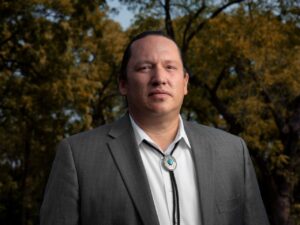 TULSA, Oklahoma (September 29, 2025) — United Indian Nations of Oklahoma (UINO) asks everyone to join them and Native communities from the United States and Canada in observing Orange Shirt Day on Sept. 30 to remember, honor and work to heal the trauma caused by residential Indian Boarding Schools.
TULSA, Oklahoma (September 29, 2025) — United Indian Nations of Oklahoma (UINO) asks everyone to join them and Native communities from the United States and Canada in observing Orange Shirt Day on Sept. 30 to remember, honor and work to heal the trauma caused by residential Indian Boarding Schools.
“United Indian Nations of Oklahoma calls on everyone to take part in Orange Shirt Day to honor the survivors and remember the victims of residential Indian boarding schools,” said Shawnee Chief and UINO Chairperson Ben Barnes. “Oklahoma had more of these schools than any other state, nearly 100, filled with Native children who were forcibly taken from their families and subjected to unimaginable trauma. Yet, to this day, there has been no true accountability.”
Barnes himself is a direct descendant of Indian Boarding School survivors and has been a vocal advocate for truth, justice and accountability.
“On this day of remembrance, we call on the United States to confront this history with honesty and action,” Barnes said. “That means conducting a full and comprehensive investigation into every residential Indian boarding school in the nation and providing the resources and support that survivors and the families of those who never came home deserve.”
For a decade, Orange Shirt Day has been an annual day of remembrance, healing, and renewed commitment to acknowledge the legacy of residential Indian Boarding Schools. The United States and Canadian governments, as well as religious institutions, operated hundreds of residential Indian Boarding Schools in the 19th and 20th centuries.
Part of the U.S. federal Indian policy during that period was to assimilate and annihilate Native cultures, even if it meant forcibly separating Native children from their families. Well over 500 residential Indian Boarding Schools are thought to have been operated by churches and the federal government in the United States, with nearly 100 of those being in Oklahoma. The full extent of the atrocities that took place in these institutions is still not fully known.
“We cannot heal what we do not confront. Survivors and their descendants carry trauma that crosses generations,” said Margo Gray, UINO Executive Director and descendant of Indian Boarding School survivors. “It is time for the federal government to operate not in denial, but with transparency. Survivors and their families deserve healing and an acknowledgement of the federal government’s sanctioned theft of culture, language, and dignity.”
Orange Shirt Day originated from the experience of Phyllis Webstad, a Northern Secwépemc (Shuswap) woman from the Stswecem’c Xgat’tem First Nation (also known as Canoe Creek Indian Band).
At the age of six, just like her mother and grandmother before her, Phyllis was taken to St. Joseph’s Mission boarding school operated by the Catholic Church in British Columbia. On her first day of school, she was stripped of the shiny new orange shirt her grandmother had scrimped and saved to buy and never saw it again.
After becoming a mother herself at 13 and dealing with a lifetime of trauma, Phyllis and others began the Orange Shirt Society in 2015. Since then, they have asked Native communities and allies from across North America to honor boarding school survivors and the children who never returned to their families by wearing an orange shirt on Sept. 30.
